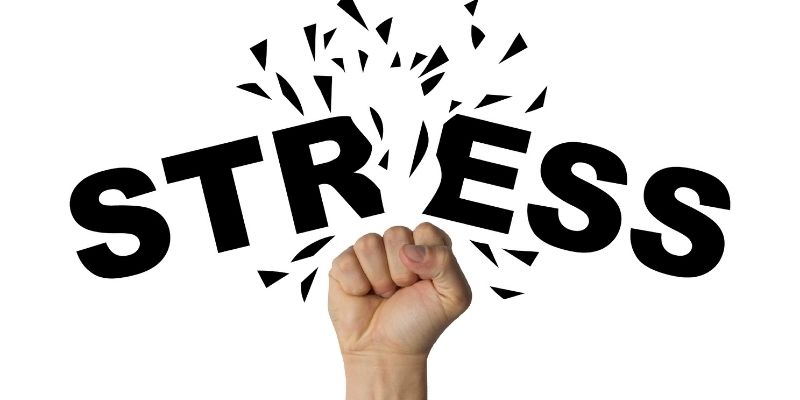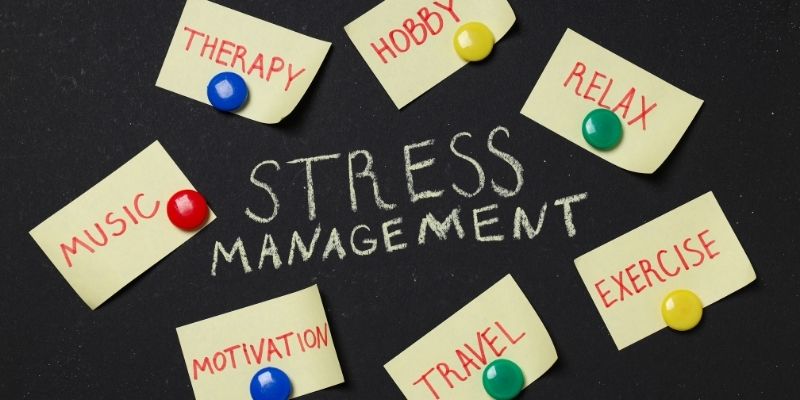A normal reaction to pressure, demands, or imagined dangers is stress. It sets off chemicals like cortisol and adrenaline, which equip the body to handle instant danger, usually known as the "fight or flight" reaction. Psychologically speaking, stress may affect your attitude, actions, and judgment. Under continual strain, you are more prone to experience anxiety, irritability, or depression. This emotional condition may throw off relationships, lower your general quality of life, and affect your effectiveness at work. First step towards properly handling stress is knowing how it shows itself. Learning how to behave quietly and productively can help you restore balance and guard your mental health rather than allowing tension to rule your life.

Meditation and Deep Breathing
Among the simplest but most effective stress-relieving techniques available is deep breathing. Stress strikes, and your breathing frequently becomes shallow and quick, feeding worry. By slowing your heart rate and lowering blood pressure, intentional deep breathing tells your brain it is okay to rest. Try breathing slowly through your nose, holding for a few seconds, then expelling from your mouth. Just a few minutes of deliberate breathing can quickly relax your nervous system and provide mental clarity.
Deep breathing alone is not enough; meditation adds consciousness. You teach your brain to be present by sitting motionless, shutting your eyes, and emphasizing your breath or a soothing mantra. This habit helps one stop obsessing on the past or the future, therefore lowering the rumination. No specific equipment or time commitment is needed for meditation; simply five to ten minutes per day will show clear advantages. Meditation helps emotional control, increases patience, and generates inner serenity through constant practice, even in the most hectic times of life.
Physical Education
One organically occurring stress reliever is physical exercise. It lowers cortisol levels and raises endorphins, your body's feel-good molecules. Frequent exercise increases self-esteem, promotes sleep, and offers a healthy release for pent-up energy and irritation. Walking, running, dancing, or swimming all help your body move and blood circulate, improving your mood and releasing stress.
Exercise offers a psychological respite as well. You're less prone to fix unpleasant ideas while concentrating on your exercise. While solitary pursuits like yoga and stretching encourage awareness, group programs or team sports may also provide social support. It's not about degree; consistency is more important. Most days, even thirty minutes of modest exercising can greatly lower stress and increase mental resilience. Choose a kind of physical exercise you love and schedule frequent sessions to maintain the equilibrium of your body and mind.
Time management and prioritising
Having too many chores and too little time is one of the main causes of stress. Good time management will help you remain focused and orderly, lessening this strain. List your chores first, then rank them in greatest need or urgency. Sort your priorities; learn to let go of or assign the rest. Establishing a reasonable daily routine with breaks helps to avoid burnout and boost output.
Time management goes beyond planning, including establishing limits. Learn to turn down obligations that contradict your priorities or moral compass. Steer clear of multitasking; it might lower productivity and raise mistakes. Rather, approach one chore at a time with your whole focus. Structure your day using timers, apps, or plans. Good time management helps you develop more room for leisure and self-care and considerably lower stress.
Social support and communication
Emotional wellness requires human interaction. Talking about what you are going through with friends, relatives, or even colleagues might provide you with emotional release and fresh ideas. Sometimes just stating your concerns helps to ease the emotional weight. Supportive interactions let one feel like they belong, which may help to offset the isolating consequences of stress. Sharing with people both pleasures and hardships helps one to develop trust and resilience.
Reaching out rather than retreating is crucial in stressed-out times. Support groups or therapy sessions provide secure, nonjudging venues to express oneself if personal talks seem too challenging. Empathy and active listening may also help to ease conflict in relationships, but they may also be causing your stress. Remember—connecting with others may be both therapeutic and inspiring. You are not alone. Schedule time for important talks, social events, or even quick visits with loved ones. Regarding stress management, the value of connection cannot be overstated.
Good Living Practices
Your everyday routines define the basis of stress control. A healthy diet cares your body and brain, therefore facilitating your ability to meet obstacles. While sugary and processed meals may aggravate anxiety and exhaustion, nutrient-dense foods such as lean proteins, whole grains, and leafy greens help stabilise energy and mood. Moreover, supporting mental clarity and emotional stability is keeping hydrated and avoiding too much coffee.
Also vital is quality sleep. Lack of rest may aggravate stress reactions, impairing cognitive ability or emotional control. Try to get seven to nine hours of peaceful sleep every night; keep to a regular bedtime schedule. Reducing noise, keeping a cool, dark atmosphere, and limiting screen time before bed help to enhance sleep quality. Little routines like stretching, writing, or winding down with soothing music may lead to a more balanced existence that organically helps to lower stress. Good habits act as a buffer, allowing you gracefully and powerfully manage the demands of life.
Finding Personal Triggers and Developing Coping Strategies
You must know your own triggers if you want to control stress. These might range greatly from personal conflict or even messy environments to job deadlines and financial concerns. Track in a stress diary what situations, persons, or behaviours often bring up anxiety. Once you see trends, you may start to respond actively instead of reactively. The first step towards transformation is awareness.
Learning good coping mechanisms helps you control triggers when they come up. Try relaxation methods, positive self-talk, or physical exercise rather than resorting to negative behaviours like avoidance or overeating. The stress cycle may be broken even with basic activities like a quick stroll, thanks-giving, or repeated soothing mantras. Although developing these tools requires time and experimentation, you get more robust the more methods you master. Your reaction to stress is often more crucial than the stressor itself; so, learning coping strategies can help you to choose peace over turmoil.

Conclusion
Though it is inevitable in life, managing stress will make all the difference. Deep breathing, consistent exercise, good time management, close relationships, and a healthy lifestyle may all help you lessen the negative consequences of stress and create a more balanced, calm existence. You take control over your emotional well-being by knowing your triggers and creating coping mechanisms.
Stress has no one-size-fits-all fix. Something that works for one individual could not for another. The secret is to deliberate about your self-care and be aggressive in forming behaviours that advance your physical and emotional wellness. Stress has no business defining your days. With constant work and the correct tools, you will be confident, calm, and clear in facing the obstacles of life.












